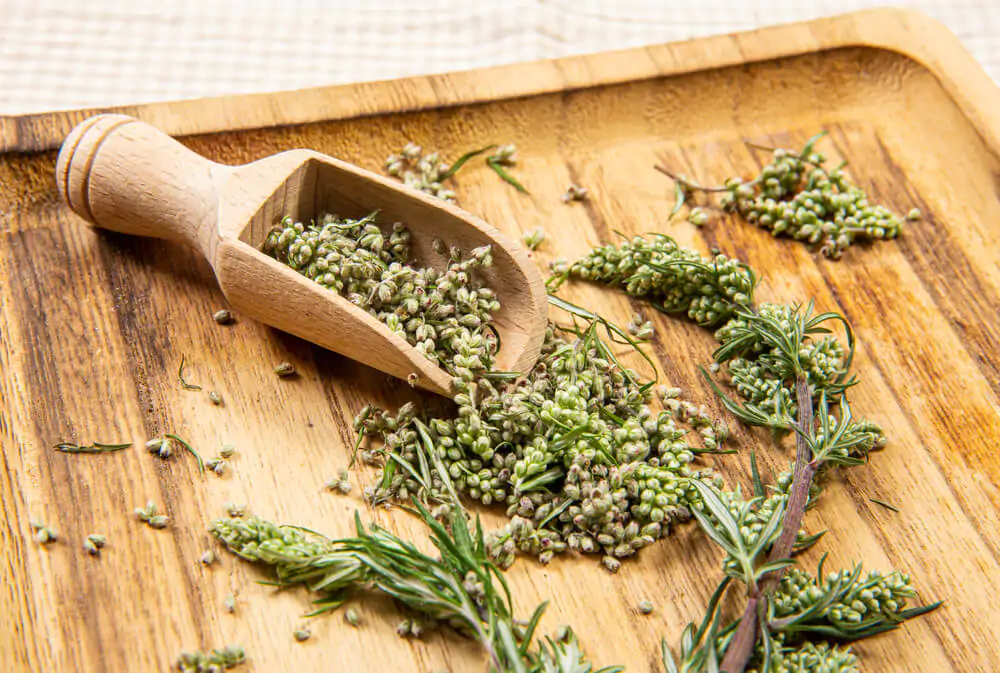Discover what is Mugwort tea, its many benefits, and how to brew it in our Mugwort tea guide.

Mugwort tea is a smooth, well-bodied herbal drink loaded with potential health benefits. It tastes a little like aniseed. Mugwort refers to an aromatic flowering plant family also known as Artemisia Vulgaris. This incredible herb is a traditional medicine in northern Europe, North America, and Asia.
My first introduction to mugwort dates back as far as I can remember. When I was little, my great-grandmother had a box of dried mugwort tea in her cabinet that she kept drinking every other day, especially during the Lunar New Year when it got cold early in the morning.
When I finally hit my mid-20s, mugwort tea finally debuted in my herbal tea collection, thanks to an incredible range of health benefits. Mugwort tea can help treat anxiety, digestion problems, and an irregular menstrual cycle.
What Does Mugwort Tea Taste Like?
Mugwort tea wakes up your taste buds with a smooth, well-rounded body and a reminiscence of aniseed. Keep it a while in your mouth before washing it down your throat. By then, you’ll recognize a beautiful balance of bitterness and sweetness in the aftertaste. And then, the subtle aroma of the tea is translated back into your nose to create blissful happiness that keeps you warm. If you like mugwort tea, you may also like Navajo tea.
Potential Health Benefits Of Mugwort Tea

Mugwort tea is rich in flavonoids, triterpenes, antioxidant agents, vitamins, and calcium that target multiple parts of your body. For centuries, people have taken Mugwort for digestive issues.
- Mugwort leaves are antifungal and antibacterial.
- The antioxidant and antimicrobial properties found in mugwort tea help fight the effects of ultraviolet radiation that slows down cell growth in the body.
- There is a high concentration of the B-family vitamins in mugwort tea, enhancing your metabolism.
- For centuries, Asian women consumed mugwort tea during their menstrual cycles. However, if you are pregnant, mugwort may trigger premature labor.
Potential Mugwort Tea Side Effects
While mugwort tea is relatively safe to consume daily, it can be toxic if taken in high doses due to the level of thujone in the leaves, which is responsible for seizures, kidney failure, and vomiting. Some people are allergic to mugwort. If you experience swelling, tingling on the tongue, headaches, or severe coughing, stop drinking mugwort tea immediately and consult your doctor. In some of the worst scenarios, severe allergies caused by mugwort tea will lead to uterine contractions and trigger menstruation. You might also be interested in learning about Senna tea.
Can You Drink Mugwort Tea Every Day?
It is generally safe for most healthy individuals to consume mugwort tea daily, in moderation. Mugwort tea is recognized for its beneficial properties, including potential anxiety relief and digestion improvement. Unlike some other teas that should be drunk 20 minutes or an hour after a meal, mugwort tea can be consumed on an empty stomach to increase its absorption effect. As a woman in her mid-20s, I’ve been drinking two to three cups of mugwort tea daily and haven’t seen any side effects or severe problems.
However, as with any herbal supplement, moderation is essential. Mugwort contains a compound called thujone, which can be toxic in high amounts, far beyond what you can drink in a cup of tea. Certain individuals should exercise caution with mugwort tea.
Pregnant women, for instance, are advised against drinking mugwort tea as it could potentially trigger premature labor. Additionally, some people might have an allergic reaction to mugwort. Symptoms of an allergy could include swelling, a tingling sensation on the tongue, headaches, or severe coughing. If any of these symptoms occur, it’s important to discontinue use and consult a healthcare professional. Consult with a healthcare provider before starting any new dietary supplement or herbal remedy, especially if you are pregnant, nursing, or on medication.
You might also be wondering, what is holy basil tea?
How To Brew Mugwort Tea
Mugwort tea is comforting during the cooler fall months or on rainy days. It is conveniently available online in tea bags or as dried leaves. You can buy mugwort tea online in bags or dry it with hot water and other additives to enhance the overall taste profile.
- I put two tablespoons of dried, crushed mugwort tea in a 17oz teapot before the hot water goes in and let it sit in the water for up to 15 minutes.
- Then, use a strainer to remove the leaves when pouring the tea into your teacup.
- To sweeten, add one teaspoon of honey to each cup of mugwort tea.
- Alternatively, use some mint and lemon balm to enhance its flavor.
I prefer to brew my tea from dried, crushed mugwort leaves. I like to drink hot mugwort tea at home when it’s getting cold in fall or on rainy days.

